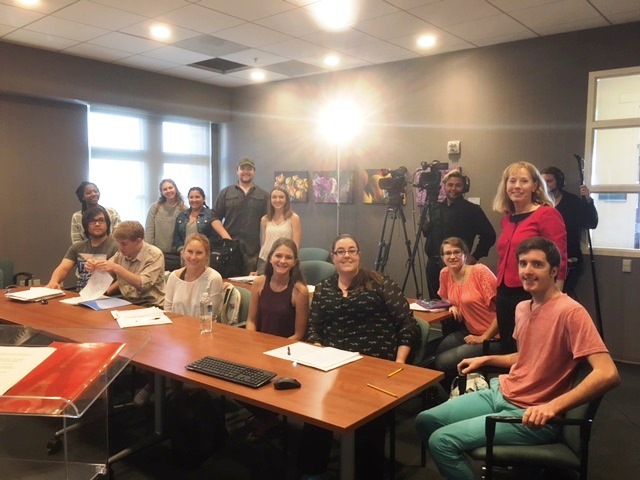What do you think you know about WWI? That the lead-up was totally isolationist, with no American aid until the last minute, then gung-ho to the front lines to certain, immensely-large scales of death?

A C-SPAN technician presides over the camera angles and cues during the filming of Jennifer Keene’s class.
You’d be wrong.
Jennifer Keene
, Ph.D, professor of history, will be busting these and other myths of The Great War on C-SPAN 3 for American History TV’s “Lectures in History” this weekend at 8 p.m. and midnight ET. The class, titled Americans at War, The Myth-Busters Edition, commemorates the 100th anniversary of World War I by exposing and debunking six common “myths” about the American experience during the war.
Professor Keene’s class debuts this Saturday on C-SPAN 3 at 8 p.m. and midnight ET.
After the class airs it will be available in its entirety here:
http://www.c-span.org/video/?405432-2/myths-america-world-war
The classroom series program will also be podcast and is usually available on the Tuesday following the debut):
http://www.c-span.org/podcasts/#lecturesInHistory
For people who don’t get C-SPAN 3 on their cable/satellite/telco systems, it streams 24 hours a day here (you have to log-in with your TV provider credentials):
http://www.c-span.org/networks/?channel=c-span-3
Featured at Top: That’s a wrap! C-SPAN crew and Jennifer Keene’s class get together at the end of lecture filming.





I watched part of this (well most), so that’s what the C-Span video group looks like. That portable editing console looks interesting. Were the students instructed to not scratch themselves in the wrong places with camera crew there? Amusing when professor asked students where do they get their information, “I know where you go!” (wikepedia).
Interesting reference about GI Bill was formulated in 1944 to avoid potential of 12 million vets marching on Washington like the WWI vets did in 1930s.
Anyway, that battle of Meuse-Argonne that was most lethal in US history (though wikepedia listed Normandy), it wasn’t clear why this WWI battle is not remembered that well. Though you mentioned WWI was not thought of much impact on US except for those who were involved. You did touch that most deaths was caused by Spanish Flu, this is quite remarkable because nobody seems to know the impact this epidemic caused except by historians (and those who watch C-span!).
Regarding Wikepedia, I occasionally look there (i.e. for this post to get correct spelling of Meuse-Argonne) but it has been regarded as not that reliable. Maybe ok for a start but when writing a serious history document, definitely need to research other sources?
Also there is a youtube channel The Great War that features short videos on specific events that occurred 100 years ago to this day. A lot of material, some of their first videos give explanation about the cause of WWI. Though I don’t quite understand it all, it helped me put many things into perspective.